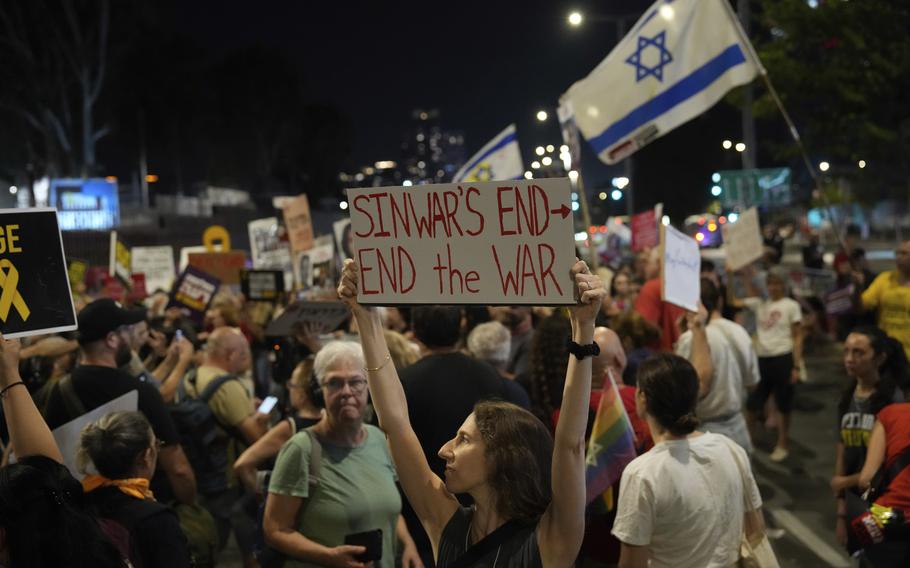
A demonstrator on Thursday, Oct. 17, 2024, in Tel Aviv, Israel, holds a sign about the killing of Hamas leader Yahya Sinwar during a protest calling for a cease-fire deal and the immediate release of hostages held by the militant group. (Ariel Schalit/AP Photo)
WASHINGTON — The death of Hamas leader Yahya Sinwar opens the door for the release of hostages and a cease-fire deal in Gaza, U.S. officials said Thursday.
“There is now the opportunity for a ‘day after’ in Gaza without Hamas in power, and for a political settlement that provides a better future for Israelis and Palestinians alike. Yahya Sinwar was an insurmountable obstacle to achieving all of those goals. That obstacle no longer exists. But much work remains before us,” President Joe Biden said.
Sinwar, the architect of the Oct. 7 attacks on Israel, was killed by the Israeli military in Gaza after eluding forces for more than a year.
“He has a lot of blood on his hands — Israeli blood, American blood, Palestinian blood. The world is better now that he’s gone,” National Security Adviser Jake Sullivan told reporters after Sinwar’s death was confirmed.
Since May, the U.S. and France have been working to mediate a cease-fire deal between Israel and Hamas to return hostages. But U.S. officials have said Sinwar was a major roadblock to a hostage deal in recent weeks, with Hamas no longer engaging in cease-fire talks. Sullivan said Sinwar repeatedly stood in the way of a cease-fire deal and seemed “more interested in causing mayhem and chaos.”
“I think his removal from the battlefield does present an opportunity to find a way forward to get the hostages home, and brings us to ‘a day after’,” Sullivan said.
Israel Defense Forces announced the death on social media at about 12:50 p.m. EST after receiving DNA confirmation. U.S. leaders and lawmakers began reacting to confirmation of Sinwar’s death shortly after.
Reporters traveling with Defense Secretary Lloyd Austin reported Austin was passed a note about Sinwar’s death earlier in the day during a NATO Defense Ministerial meeting in Brussels.
Air Force Maj. Gen. Pat Ryder, the Pentagon’s top spokesman, said Austin spoke with Israeli Minister of Defense Yoav Gallant following the initial reports but has not spoken with the minister since Sinwar’s death was confirmed.
The two have spoken almost daily in recent months as the U.S. ramped up its support for Israel.
The U.S. recently deployed a Terminal High Altitude Area Defense battery to Israel and roughly 100 soldiers for the second time in a year. Additionally, the U.S. has bolstered its military force in the region with aircraft carrier strike groups, amphibious ready groups, and destroyers as a show of force and support for Israel.
American special operations and intelligence forces were also directed last year by Biden to work with Israel to track Hamas leaders in Gaza, which the U.S. said were living and moving through hundreds of miles of tunnels underground.
“To be crystal clear, this was an Israeli operation. There were no U.S. forces directly involved. The United States has helped contribute information and intelligence as it relates to hostage recovery and the tracking and locating of Hamas leaders who have been responsible for holding hostages, and so certainly that contributes, in general, to the picture. But again, this was an Israeli operation,” Ryder said.
With Sinwar dead, U.S. leaders said they are pressing forward with efforts to end the conflict.
Late Thursday afternoon, Austin urged for the release of all hostages and pushed for a “lasting cease-fire.”
“We will continue to work tirelessly to bring the hostages home to their families, to promote diplomacy as the principal mechanism for ending the conflicts in both Gaza and Lebanon, and to secure a more hopeful, secure, and peaceful period in a region that has known such sorrow,” he said.
Biden, and other U.S. leaders, committed to remaining in close contact with Israel in the coming days.
“In the days ahead, the United States will redouble its efforts with partners to end this conflict, secure the release all hostages, and chart a new path forward that will enable the people of Gaza to rebuild their lives and realize their aspirations free from war and free from the brutal grip of Hamas,” Secretary of State Antony Blinken said.